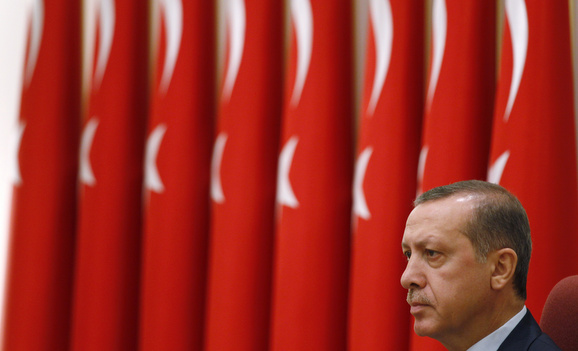Last September, I had the privilege of attending a very special event by NATO Council of Canada hosting the Turkish Minister of Foreign Affairs Ahmet Davutoğlu. The occasion attracted particular attention, as it was among a series of Mr Davutoğlu’s engagements, which together marked the first visit of a Turkish Foreign Minister to Canada in over a decade. At this event, Davutoğlu elaborated on his progressive vision for Turkish diplomacy and underlined the country’s growing influence in the region and beyond.
Fast-forward to June 2013, and one sees that the #OccupyGezi protests in Turkey have lasted for more than three weeks. As protests in several major cities continue, so does the use of excessive police violence. Foreign media and politicians have not remained silent. Prime Minister Recep Tayyip Erdoğan, who was called the leader of the year by Time Magazine in 2011, is now building a radically different reputation, with the Economist depicting him in a sultan outfit. In order to save his image at home, the Prime Minister’s loyalists have been quick to engage in a political shouting match through their personal twitter accounts as well as government-issued statements. Consequently, Turkish diplomacy seems to have taken a sharp turn. The real question is, how sharp has this turn really been, and what sort of implications will there be for Turkey’s key allies?
[captionpix align=”left” theme=”elegant” width=”300″ imgsrc=”http://natoassociation.ca/wp-content/uploads/2013/06/image001.jpg” captiontext= “Protestors push back on a police car in Taksim Square while carnations mark the four people killed throughout the protests, June 22.”]
To assess the change in Turkish foreign policy, we first need to understand the fundamentals of Turkish diplomacy prior to the anti-government protests. In his Toronto talk last September, Foreign Minister Davutoğlu shed light onto the Turkish approach. Davutoğlu’s “zero problems with neighbours” principle is a dynamic policy promoting cooperation and partnerships with neighbouring countries. It is also a vision, which aims to establish Turkey as the hub of regional integration, with Turkey taking a proactive mediator role in many of the region’s conflicts including the Hamas-Fatah divide, and the Iranian nuclear talks. Mr. Davutoğlu also commented on Turkey’s European Union accession plans, drawing attention to the fact that the economically unstable and culturally exclusive EU could benefit from Turkey’s geopolitical position and young population, just as much as Turkey could benefit from the EU.
Following the recent events however, the Turkish vision for proactive, partnership-based foreign policy seem to have failed. On the 13th of June, the European Parliament adopted a non-binding resolution that deplored “the reactions of the Turkish Government and of Prime Minister Erdoğan, whose unwillingness to take steps towards reconciliation, to apologize or to understand the reactions of a segment of the Turkish population have only contributed to further polarization”. Following Erdoğan and Davutoğlu’s dismissal of the resolution’s legitimacy, Turkey’s European Union Affairs Minister Egemen Bağış issued a statement on the 17th that warned the representatives of European member states. The statement read, “certain members of European Parliament need to understand that making such bold and irresponsible comments on Turkey’s internal affairs would have some costs”.
Statements and non-binding documents can easily be ignored, but it is more difficult to change actions. On June 20, Germany introduced a new obstacle to Turkey’s accession road by voting against the opening of a new chapter for negotiations, which was set to take place in the end of June. It is not certain what sort of implications this will have; it might merely cause a delay, but it could also irreversibly sour EU-Turkey relations. Increasing tensions between Germany and Turkey deserve special attention, as Germany is not only a heavyweight in the EU, but also Turkey’s biggest trading partner.
[captionpix align=”right” theme=”elegant” width=”300″ imgsrc=”http://natoassociation.ca/wp-content/uploads/2013/06/image003.jpg” captiontext= “German Chancellor Angela Merkel and Turkey’s Prime Minister Recep Tayyip Erdogan at a joint news conference in Ankara, February 25.”]
With respect to North America, thus far, Turkey has been able to hold onto its old partnerships. The United States for one, has issued several statements underlining on-going concerns, but has for the most part avoided making any bold declarations. In a similar manner, Canada has been careful not to interfere with the internal affairs of a key strategic partner in the region. American efforts in branding the opposition forces in Syria, who have enjoyed Turkey’s backing from the beginning, as the only democratic solution for the country’s future probably also contribute to their sensitivity about Turkey.
As for Turkey’s immediate regional neighbourhood, the notion of “Zero Problems” has panned out. In light of the on-going political troubles at home and increasing victories of Syrian President Bashar al-Assad’s armies, Turkey seems to have toned down its muscle-flexing. Having once attempted to mediate between Iran and the rest of the world on the topic of nuclear power, Turkey now seems to have positioned itself at the opposite of Iran-Assad-Hezbollah alliance. Furthermore, with the election of moderate leader Hasan Rowhani in Iran, Turkey’s services might no longer be needed. Lastly, Erdoğan was met with coldness during his recent North Africa trip. In a time when their own leaders completely ignored the public opinion, young people from Egypt and Tunisia have supported Erdoğan for his brave stance towards Israel’s policies concerning the Occupied Territories. Disgruntled voices rising from Egypt, and the half-hearted welcome the Tunisian public prepared for Erdoğan now point to his decreasing popularity in the region. Arab Spring nations do not seem to have a lot of patience for leaders who do not lend an ear to their own constituencies.
Turkey, a key NATO ally and a candidate country for EU membership, is currently in a very tight spot. With the ongoing internal pressure for a more inclusive, open democracy and opinion polls showing the AK Party bleeding support, Ankara’s focus seems to have moved from multi-dimensional proactive strategy building to short term political gains. The Reyhanlı bombings where 52 people died happened just a little bit over a month, and the war in Syria is far from quieting down. This is not a time to lose friends. Prime Minister Erdoğan should not allow his government’s foreign policy efforts to go down the drain for the sake of appearing tough on the domestic stage. Instead, the AK Party government should focus on winning hearts and minds at home by opening up communications channels and reaching out to the protesters. This way the Turkish government can actually enjoy strong domestic support bases instead of putting so much energy into crafting the illusion of being powerful in the international arena.
[captionpix align=”center” theme=”elegant” width=”300″ imgsrc=”http://natoassociation.ca/wp-content/uploads/2013/06/image005.jpg” captiontext= “Turkish lawyers march in support of the anti-government protests on June 12 in Ankara.”]




